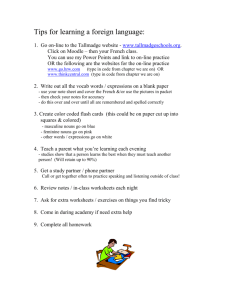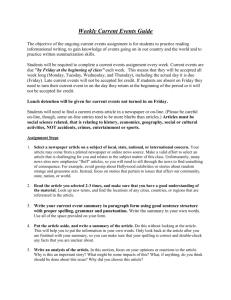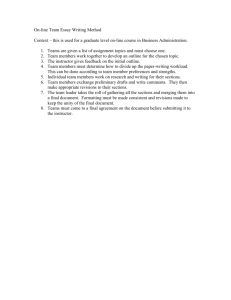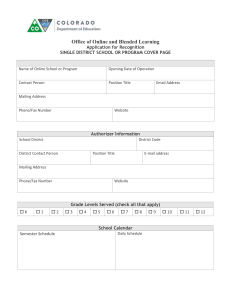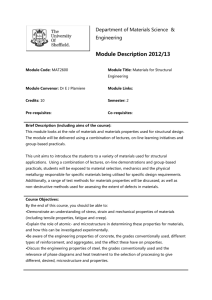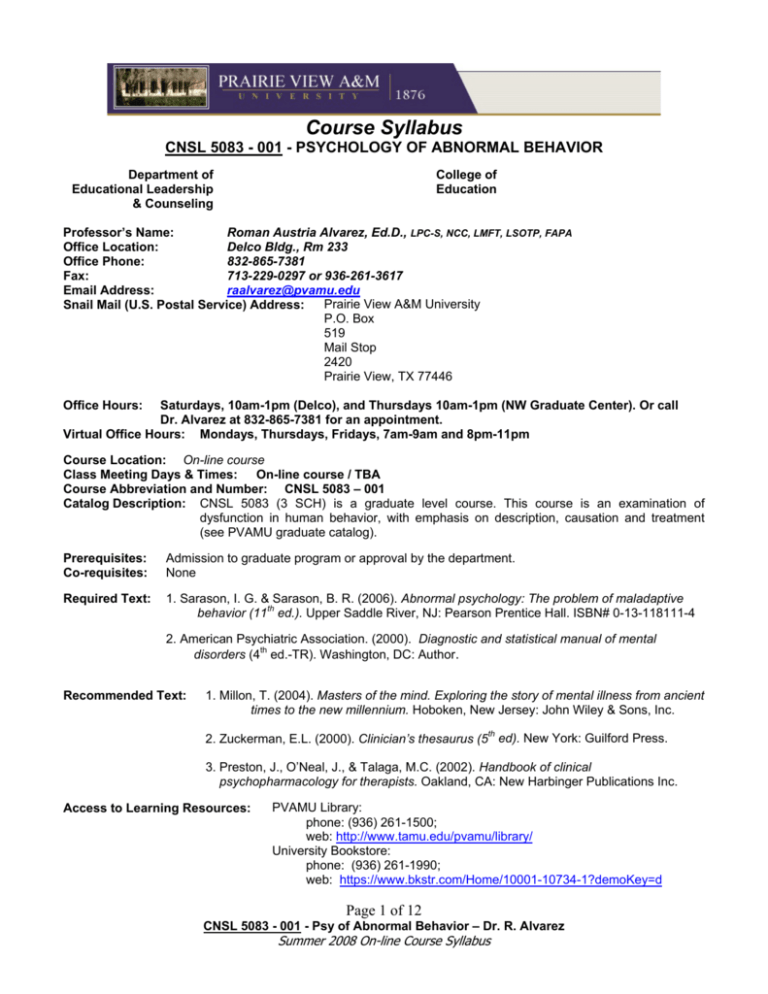
Course Syllabus
CNSL 5083 - 001 - PSYCHOLOGY OF ABNORMAL BEHAVIOR
Department of
Educational Leadership
& Counseling
College of
Education
Professor’s Name:
Roman Austria Alvarez, Ed.D., LPC-S, NCC, LMFT, LSOTP, FAPA
Office Location:
Delco Bldg., Rm 233
Office Phone:
832-865-7381
Fax:
713-229-0297 or 936-261-3617
Email Address:
raalvarez@pvamu.edu
Prairie View A&M University
Snail Mail (U.S. Postal Service) Address:
P.O. Box
519
Mail Stop
2420
Prairie View, TX 77446
Office Hours:
Saturdays, 10am-1pm (Delco), and Thursdays 10am-1pm (NW Graduate Center). Or call
Dr. Alvarez at 832-865-7381 for an appointment.
Virtual Office Hours: Mondays, Thursdays, Fridays, 7am-9am and 8pm-11pm
Course Location: On-line course
Class Meeting Days & Times: On-line course / TBA
Course Abbreviation and Number: CNSL 5083 – 001
Catalog Description: CNSL 5083 (3 SCH) is a graduate level course. This course is an examination of
dysfunction in human behavior, with emphasis on description, causation and treatment
(see PVAMU graduate catalog).
Prerequisites:
Co-requisites:
Admission to graduate program or approval by the department.
None
Required Text:
1. Sarason, I. G. & Sarason, B. R. (2006). Abnormal psychology: The problem of maladaptive
behavior (11th ed.). Upper Saddle River, NJ: Pearson Prentice Hall. ISBN# 0-13-118111-4
2. American Psychiatric Association. (2000). Diagnostic and statistical manual of mental
disorders (4th ed.-TR). Washington, DC: Author.
Recommended Text:
1. Millon, T. (2004). Masters of the mind. Exploring the story of mental illness from ancient
times to the new millennium. Hoboken, New Jersey: John Wiley & Sons, Inc.
2. Zuckerman, E.L. (2000). Clinician’s thesaurus (5th ed). New York: Guilford Press.
3. Preston, J., O’Neal, J., & Talaga, M.C. (2002). Handbook of clinical
psychopharmacology for therapists. Oakland, CA: New Harbinger Publications Inc.
Access to Learning Resources:
PVAMU Library:
phone: (936) 261-1500;
web: http://www.tamu.edu/pvamu/library/
University Bookstore:
phone: (936) 261-1990;
web: https://www.bkstr.com/Home/10001-10734-1?demoKey=d
Page 1 of 12
CNSL 5083 - 001 - Psy of Abnormal Behavior – Dr. R. Alvarez
Summer 2008 On-line Course Syllabus
Course Goals or Overview:
This course is designed to explore and understand the primary features and frameworks of the major
mental disorders as described and catalogued in the current Diagnostic and Statistical Manual of Mental
Disorders-IV-TR. The behavioral, cognitive, affective, sensory-perceptual manifestations and dynamics of
dysfunctions in human behaviors will be explored. A biopsychosocial perspective in examining
psychopathology will be emphasized. Such a perspective encompasses genetics, neurochemistry,
evolutionary mechanisms, psychological models, and social and cultural influences. Both theory and
research in psychopathology will be integrated in addressing the challenge of clinical assessment,
differential diagnosis, definitive diagnosis, treatment and prognosis .
The text book contains seventeen (17) chapters. Most will be covered in class, but students are
responsible for all required objectives even if they have not been covered in class. It contains a
combination of lecture, discussion, experiential, critical analysis of research, individual, and group work.
The textbook outlines chapter learning objectives and provides PowerPoint Slides for each chapter. They
can be downloaded from www.prenhall.com/sarason
Course Learning Objectives
At the end of this course, students are expected to:
1. Understand the history, philosophy and trends in clinical mental health counseling & psychopathology.
2. Know principles and models of assessment (in particular DSM IV-TR), case conceptualization, theories of human
development and concepts of normalcy and psychopathology leading to diagnoses and appropriate counseling
treatment plans.
3. Know the etiology, the diagnostic process and nomenclature, treatment, referral, and prevention of mental and/or
emotional disorders, personality & developmental disorders, chemical dependency and other addictions.
4. Use principles and practices of diagnosis (in particular DSM-IV TR), treatment, referral, and prevention of mental
and/or emotional disorders, personality & developmental disorders, chemical dependency and other addictions to
initiate, maintain and terminate counseling.
5. Describe the principles of mental health, including prevention, intervention, consultation, education, advocacy,
and outreach as well as the operation of those programs and networks that promote mental health in a multicultural
society.
Course Evaluation Methods
This course will utilize the following instruments to determine student grades:
Exercises & Research – written assignments designed to supplement and reinforce course material.
Projects – web development assignments designed to measure ability to apply presented course material.
Tests – written tests designed to measure knowledge of presented course material.
Class Participation – daily attendance and participation in class discussions.
Grading Matrix
Instrument
Value (points or percentages)
Total
Test # 1- On-line Chapter Exam (Chaps 1-5)
125 (perfect score) / 5 = 25 points
25
Test # 2- On-line Chapter Exam (Chaps 6-11)
150 (perfect score) / 6 = 25 points
25
Test # 3- On-line Chapter Exam (Chaps 12-17)
150 (perfect score) / 6 = 25 points
25
Group Project- Chapter On-line Presentation
100 points
100
Individual Response to On-line Presentation
75 points
75
One (1) Character Diagnosis
100 points
100
Final of Research Project
100 points
100
Class Participation & Attendance
5.56 points x 9 weeks = 50 points
50
Total:
500
Grade Determination: A = 500 – 450pts; B = 449 – 400pts; C = 399 – 350pts;
D = 349 – 300pts; F = 299pts or below
TAMU System-PVAMU’s grading system: A=95-100; B=85-94; C=75-84; D=65-74; F=64 & below
Page 2 of 12
CNSL 5083 - 001 - Psy of Abnormal Behavior – Dr. R. Alvarez
Summer 2008 On-line Course Syllabus
Rubric for TrueOutcomes: Target (95-100); Acceptable (94-85); Unacceptable (84 & below).
Course Procedures
Submission of Assignments:
1. On-line Chapter Exams: Test 1 (Ch 1-5), Test 2 (Ch 6-11) & Test 3 (Ch 12-17) – E-mail Test 1, 2, and 3 to
Professor (25 points per test): Follow these steps:
•
Go to http://wps.prenhall.com/hss_sarason_abnormal_11
or
http://wps.prenhall.com/hss_sarason_abnormal_11/0,9498,1534370-,00.html
•
•
•
•
•
•
•
Then go to Profile to register (fill out your profile information completely and accurately; include your e-mail
address… make sure that you enter your e-mail address in the appropriate profile space provided.
Once your profile is completed you may begin your chapter exam. To do this, select or click on the chapter
(see top bar of the webpage numbered 1 to 17)
Once a chapter is selected, click on Study Guide.
Then click on Chapter Exam specific to that chapter.
Take the on-line Chapter Exam (consisting of 27 questions per chapter… Ignore essay questions # 25 &
26).
Submit answers for grading.
Bundle up chapters 1-5 (Test 1), chapters 6-11 (Test 2), and chapters 12-17 (Test 3) respectively on a
single document. Then e-mail your bundled chapter exam results to your professor via attachment through
WebCT e-mail. Make sure that you have saved your bundled chapter exam results in your file.
2. Group Project - Chapter On-line Presentation (100 points): Each student is expected to join a group or pair
up with another student in this class (a group will consist of 2 or more students). Group assignment will be decided
by the professor for simplicity. Chapters 8 to 17 of the textbook will serve as topic for group assignment and oral
presentation. There will be 12 groups to report during this semester.
Chapter On-line Presentation: Each group will e-mail (via WebCT e-mail) to the professor their on-line
presentation on a specified chapter from the required text. Each group will provide a comprehensive on-line
presentation by:
¾ Answering the Learning Objective questions for the chapter assigned to the group. Learning objectives
for
each
chapter
is
found
on
the
textbook’s
website
at
http://wps.prenhall.com/hss_sarason_abnormal_11/
¾ Using and building on the powerpoint slides found in the Companion website for text:
http://wps.prenhall.com/hss_sarason_abnormal_11/ . Be creative!
¾ Incorporating on-line or U-tube demo of chapter concepts, video clips, etc., in their on-line presentation.
Be creative!
¾ Submitting 2 journal research articles supporting chapter concepts. Summarize the research findings
and discussion of the 2 research articles. (Note: A research article has Methods). Send these
research articles/references to your professor.
¾ Providing at least 1 critical question (related to their on-line chapter report) for WebCT discussion.
On-line reporters are required to respond to WebCT respondents asking for a response to a question.
Reporters may choose to respond to all respondents (optional).
¾ Sending / providing Chapter outline (with names of group members and bibliography) for each class
member and for the professor.
3. Individual Response to On-line Presentation (6.25 points per presentation response or 75 points): Each
student is required to comment on the on-line presentation and then respond to the critical question posted on
WebCT by the on-line reporters. The discussion reply should be at least 300 words. Once your discussion reply is
complete, reply to one (1) other reply to complete the discussion assignment for that date.
WebCT reply must be respectful, analytical, and succinct. Everyone is expected to observe and follow basic on-line
Page 3 of 12
CNSL 5083 - 001 - Psy of Abnormal Behavior – Dr. R. Alvarez
Summer 2008 On-line Course Syllabus
decorum [e.g., no shouting (i.e., WRITING IN ALL CAPITAL LETTERS), avoid pejorative language, no large
attachments, confidentiality, common courtesy, and proof-read your response or e-mail, etc.).
4. Character diagnosis (100 points): During the course of the semester, students will watch one (1) movie of
their choosing (see movie list below), and create a multiaxial diagnosis of one (1) of the characters from the chosen
movie. Note: You are required to use the template provided for this assignment. Students are expected to clinically
justify their reasoning for each Axis I and/or Axis II diagnosis using the DSM-IV TR diagnostic criteria (use DSMIVTR textbook). Supporting data or information taken from the movie about the character must be consistent with
the DSM-IVTR diagnostic criteria and vice-versa. Consult the DSM-IV TR textbook for diagnostic criteria of your
character’s diagnosis or diagnoses.
Movie list:
Movie list:
Monster’s Ball
American History X
One Flew Over the
Cuckoo’s Nest
Sleeping with the Enemy
Human Stain
Beautiful Mind
Corrina, Corrina
The War
Sling Blade
What About Bob
The Dream Team
28 Days
Movie list:
The Cell
Caveman’s Valentine
The Last King of Scotland
Sybil
Raising Cain
Psycho
Perfume: Story of a
murderer
White Oleander
The Hours
Fatal Attraction
Rain Man
Dead Man Walking
Ed Wood
Unstrung Heroes
Saved!
Diary of a Mad Black
Woman
Silence of the Lamb
Red Dragon
My Girl
Benny & Joon
Citizen Ruth
The Other Sister
The Marquis de Sade
Postcard from the Edge
Movie list:
Notes on a scandal
Little Children
What’s Eating Gilbert
Grape
To Wong Foo, Thanks for
Everything
Basic Instincts
Agnes of God
Mommie Dearest
American Beauty
As Good As It Gets
Girl, Interrupted
Awakenings
Breakfast on Pluto
5.
Final Research Paper: Review (i.e., Summarize, Critique and capture Implications) of Research
Articles’ Literature, Methods & Findings (100 points): Each student will complete a 4-6 page Review of
research articles on an instructor approved topic germane to Abnormal Psychology or Psychopathology. A Review
consists of summarizing the literature, research methods, research findings, research discussion and implications;
it also includes critiquing the research methods, research findings, research discussion and implications. Ask your
professor for approval of your chosen research topic before you proceed. You may also research topics mentioned
or covered in the textbook. The Review must be typed, double-spaced, 12pt. font size, in APA format, with APA
reference, and contain at least four (4) primary references [2 of which must be research articles recently
published (i.e., within the last 5 years) in professional journals]. A research article has method(s). Other
references may be from position paper, theoretical paper, or review of literature published in professional journals.
You are not to use your textbook as one of your 4 primary references. For APA style of editorial writing, please
visit
http://www.apastyle.org/previoustips.html (APA Style of Editorial Writing) or
http://www.psychwww.com/resource/apacrib.htm (APA Style Resources)
6.
Class Participation (50 points): Students are required to attend all scheduled on-line class activities, and
be prepared to engage in rich and robust discussions regarding the learning topic(s). Students are also expected to
actively participate in and complete all assignments, homework, in-class group work, and/or WebCT discussion.
More information and instructions will be given on-line in class when WebCT discussion is required.
WebCT reply must be respectful, analytical, and succinct. Everyone is expected to observe and follow basic on-line
decorum [e.g., no shouting (i.e., WRITING IN ALL CAPITAL LETTERS), avoid pejorative language, no large
attachments, confidentiality, common courtesy, and proof-read your response or e-mail, etc.).
Page 4 of 12
CNSL 5083 - 001 - Psy of Abnormal Behavior – Dr. R. Alvarez
Summer 2008 On-line Course Syllabus
Formatting Documents:
Microsoft Word is the standard word processing tool used at PVAMU. If you’re using other word processors, be
sure to use the “save as” tool and save the document in either the Microsoft Word, Rich-Text, or plain text format.
Exam Policy
Exams should be taken as scheduled. No makeup examinations will be allowed except under documented
emergencies (See Student Handbook). Also see information on on-line chapter exam discussed above in course
procedures.
Professional Organizations and Journals
WEBSITES RELEVANT TO THIS COURSE
Complete List of DSM-IV Codes
http://www.psychnet-uk.com/dsm_iv/_misc/complete_tables.htm
DSM-IV and Diagnostic Resources for Mental Disorders
http://mysite.verizon.net/res7oqx1/
Genome Project
http://www.ornl.gov/sci/techresources/Human_Genome/posters/chromosome/
ICD-9–CM International Classification of Diseases
http://www.cs.umu.se/%7Emedinfo/ICD9.html
Institute for Advanced Studies in Personology and Psychopathology (Theodore Millon, PhD, DSc).
http://www.millon.net/
Invisible Children’s Project
http://www.mhatexas.org/InvisibleChildrensMainPage.htm#resources
Mental Health America of Texas http://www.mhatexas.org/
NAADAC-The Association for Addiction Professional http://naadac.org/
OnMind Info http://www.onmind.info/
Paper Writing Resources in Psychology (Encyclopedia in Psychology)
http://www.psychology.org/links/Resources/Writing/
Quick Reference to Psychotropic Medication http://psychceu.com/quickreference.doc.html
Structural Psychoanalysis and Integrative Psychotherapy (Robert Moore, PhD).
http://www.robertmoore-phd.com/Index.cfm
WEBSITES RELEVANT TO THE COUNSELING PROFESSION
http://www.counseling.org/ (American Counseling Association)
http://www.apastyle.org/previoustips.html (APA Style of Editorial Writing)
http://www.psychwww.com/resource/apacrib.htm (APA Style Resources)
http://www.amhca.org/ (American Mental Health Counseling Association)
http://www.txca.org/tca/Default.asp (Texas Counseling Association)
Page 5 of 12
CNSL 5083 - 001 - Psy of Abnormal Behavior – Dr. R. Alvarez
Summer 2008 On-line Course Syllabus
http://www.dshs.state.tx.us/counselor/default.shtm (Texas Licensed Professional Counselor/LPC)
http://www.houstonlpcassociation.org/ (Houston LPC Association)
http://www.nbcc.org/ (National Board for Certified Counselors/NCC)
http://studentworks.nbcc.org/
(Student Works - Resources for Counseling Students)
http://www.tea.state.tx.us/ (Texas Education Agency)
http://www.schoolcounselor.org/ (American School Counselor Association)
http://www.collegecounseling.org/ (American College Counseling Association)
http://www.acesonline.net/
(Association for Counselor Education and Supervision)
http://www.bgsu.edu/colleges/edhd/programs/AMCD/
(Association for Multicultural Counseling and Development / AMCD)
http://www.americanpsychotherapy.com/index.php
(American Psychotherapy Association)
http://www.cgjunghouston.org/ (The Jung Center, Houston, Texas)
References
Bernheim, K. F. (2004). The Lanahan cases and readings in abnormal behavior (2nd ed.).
Publishers.
Baltimore: Lanahan
Canino, I.A., & Spurlock, J. (2000). Culturally diverse children and adolescents : Assessment, diagnosis, and
treatment. New York : The Guilford Press.
Dziegielewski, S.F. (2002). DSM-IV-TR in action. New York : John Wiley & Sons.
Hansell, J., & Damour, L. (2005). Abnormal psychology. New York, NY: John
Wiley & Sons, Inc.
Harley, D. A. & Dillard, J.M. (Eds). (2005). Contemporary mental health issues among african americans.
Alexandria, VA: American Counseling Association.
Kalsched, D. (1996). The inner world of trauma. New York: Routledge.
Jaspers, K. (author) & Hoenig, J. & Hamilton, M.W. (translators). (1997). General Psychopathology. New Jersey:
The Johns Hopkins University Press.
Moore, R. (1991). King, warrior, magician, and lover: Rediscovering the archetypes of the mature masculine. San
Francisco: Harper.
Morrison, J. (1995). DSM-IV made easy: The clinicians guide to diagnosis. New York: The Guilford Press.
Preston, J., O’Neal, J., & Talaga, M.C. (2002). Handbook of clinical psychopharmacology for therapists. Oakland,
CA: New Harbinger
Publications, Inc.
Samenow, S. (2004). Inside the criminal mind. New York: Crown Business.
Page 6 of 12
CNSL 5083 - 001 - Psy of Abnormal Behavior – Dr. R. Alvarez
Summer 2008 On-line Course Syllabus
University Rules and Procedures
Disability statement (See Student Handbook):
Students with disabilities, including learning disabilities, who wish to request accommodations in class should
register with the Services for Students with Disabilities (SSD) early in the semester so that appropriate
arrangements may be made. In accordance with federal laws, a student requesting special accommodations must
provide documentation of their disability to the SSD coordinator.
Any student with a disability (e.g., physical, learning, psychiatric, vision, hearing, etc.) who needs to arrange special
accommodations should contact the PVAMU Office of Disability Services at (936) 261 - 3581 or at their office
location, Evans Hall- Rm 315 to obtain proper documentation at the beginning of each semester. Faculty
members are authorized to provide only the accommodations requested by the Office of Disability Services.
Academic misconduct (See Student Handbook):
You are expected to practice academic honesty in every aspect of this course and all other courses. Make sure you
are familiar with your Student Handbook, especially the section on academic misconduct. Students who engage in
academic misconduct are subject to university disciplinary procedures.
Forms of academic dishonesty:
1. Cheating: deception in which a student misrepresents that he/she has mastered information on an
academic exercise that he/she has not mastered; giving or receiving aid unauthorized by the instructor
on assignments or examinations.
2. Academic misconduct: tampering with grades or taking part in obtaining or distributing any part of a
scheduled test.
3. Fabrication: use of invented information or falsified research.
4. Plagiarism: unacknowledged quotation and/or paraphrase of someone else’s words, ideas, or data as
one’s own in work submitted for credit. Failure to identify information or essays from the Internet and
submitting them as one’s own work also constitutes plagiarism.
Nonacademic misconduct (See Student Handbook)
The university respects the rights of instructors to teach and students to learn. Maintenance of these rights
requires campus conditions that do not impede their exercise. Campus behavior that interferes with either (1) the
instructor’s ability to conduct the class, (2) the inability of other students to profit from the instructional program, or
(3) campus behavior that interferes with the rights of others will not be tolerated. An individual engaging in such
disruptive behavior may be subject to disciplinary action. Such incidents will be adjudicated by the Dean of
Students under nonacademic procedures.
Sexual misconduct (See Student Handbook):
Sexual harassment of students and employers at Prairie View A&M University is unacceptable and will not be
tolerated. Any member of the university community violating this policy will be subject to disciplinary action.
Attendance Policy:
Prairie View A&M University requires regular class attendance. Excessive absences will result in lowered grades.
Excessive absenteeism, whether excused or unexcused, may result in a student’s course grade being reduced or
in assignment of a grade of “F”. Absences are accumulated beginning with the first day of class.
In this class, absences (excused or unexcused) of 12 contact hours or more will result in the
student’s final grade getting dropped by one (1) letter grade (for example a final letter grade of A
will drop to a B; a final letter grade of B will drop to a C; a final letter of grade of C will drop to a
D; and a final letter grade of D will drop to an F).
Students with excessive absences (excused or unexcused), more than 18 contact hours, will earn
a grade of F (failure).
Page 7 of 12
CNSL 5083 - 001 - Psy of Abnormal Behavior – Dr. R. Alvarez
Summer 2008 On-line Course Syllabus
Student Academic Appeals Process
Authority and responsibility for assigning grades to students rests with the faculty. However, in those instances
where students believe that miscommunication, errors, or unfairness of any kind may have adversely affected the
instructor's assessment of their academic performance, the student has a right to appeal by the procedure listed in
the Undergraduate Catalog and by doing so within thirty days of receiving the grade or experiencing any other
problematic academic event that prompted the complaint.
Technical Considerations for Online and Web-Assist Courses
Minimum Hardware and Software Requirements:
-Pentium with Windows XP or PowerMac with OS 9
-56K modem or network access
-Internet provider with SLIP or PPP
-8X or greater CD-ROM
-64MB RAM
-Hard drive with 40MB available space
-15” monitor, 800x600, color or 16 bit
-Sound card w/speakers
-Microphone and recording software
-Keyboard & mouse
-Netscape Communicator ver. 4.61 or Microsoft Internet Explorer ver. 5.0 /plug-ins
-Participants should have a basic proficiency of the following computer skills:
·Sending and receiving email
·A working knowledge of the Internet
·Proficiency in Microsoft Word
·Proficiency in the Acrobat PDF Reader
·Basic knowledge of Windows or Mac O.S.
Netiquette (online etiquette): students are expected to participate in all discussions and virtual classroom chats
when directed to do so. Students are to be respectful and courteous to others in the discussions. Foul or abusive
language will not be tolerated. When referring to information from books, websites or articles, please use APA
standards to reference sources.
Technical Support: Students should call the Prairie View A&M University Helpdesk at 936-261-2525 for technical
issues with accessing your online course. The helpdesk is available 24 hours a day/7 days a week. For other
technical questions regarding your online course, call the Office of Distance Learning at 936-261-3290 or 936-2613282
Communication Expectations and Standards:
All emails or discussion postings will receive a response from the instructor within 48 hours.
You can send email anytime that is convenient to you, but I check my email messages continuously during the day
throughout the work-week (Monday through Friday). I will respond to email messages during the work-week by the
close of business (5:00 pm) on the day following my receipt of them. Emails that I receive on Friday will be
responded to by the close of business on the following Monday.
Submission of Assignments:
Assignments, Papers, Exercises, and Projects will distributed and submitted through your online course. Directions
for accessing your online course will be provided. Additional assistance can be obtained from the Office of
Distance Learning.
Discussion Requirement:
Because this is an online course, there will be no required face to face meetings on campus. However, we will
participate in conversations about the readings, lectures, materials, and other aspects of the course in a true
seminar fashion. We will accomplish this by use of the discussion board.
Page 8 of 12
CNSL 5083 - 001 - Psy of Abnormal Behavior – Dr. R. Alvarez
Summer 2008 On-line Course Syllabus
Students are required to log-on to the course website often to participate in discussion. It is strongly advised that
you check the discussion area daily to keep abreast of discussions. When a topic is posted, everyone is required
to participate. The exact use of discussion will be determined by the instructor.
It is strongly suggested that students type their discussion postings in a word processing application and save it
to their PC or a removable drive before posting to the discussion board. This is important for two reasons: 1) If for
some reason your discussion responses are lost in your online course, you will have another copy; 2) Grammatical
errors can be greatly minimized by the use of the spell-and-grammar check functions in word processing
applications. Once the post(s) have been typed and corrected in the word processing application, it should be
copied and pasted to the discussion board.
MISCELLANEOUS INFORMATION
TrueOutcomes
TrueOutcomes is a tool that Prairie View A&M University uses for assessment purposes. One or more of your
assignments will be considered an "artifact" (an item of coursework that serves as evidence that course objectives
are met) and will be loaded into both WebCT and TrueOutcomes. The assignment(s) to be used as TrueOutcomes
artifacts will be identified by your instructor.
TrueOutcomes also allows students to electronically post documents that can be used to create an electronic
portfolio (e-portfolio) for future employment and/or educational endeavors. More information will be provided during
the semester, but for general information, you can visit the TrueOutcomes web site at: www.trueoutcomes.net
STUDENT’S RESPONSIBILITIES
1. Being an active participant in the educational process.
2. Reading the textbook and other assigned materials PRIOR to class meetings; on-time attendance for class;
and participate in classroom discussions and activities.
3. Satisfactory completion of all assigned projects.
4. Satisfactory performance on all activities (both didactic and experiential).
5. Being familiar with the student responsibilities contained within the current PVAMU Catalog at
http://www.pvamu.edu/pages/231.asp
PROFESSORS’ RESPONSIBILITES
1. Preparation of lectures, classroom presentation, and facilitate discussion.
2. Preparation and evaluation of assignments and projects.
3. Provide student feedback regarding course performance.
PHONE CALLS TO PROFESSORS
When leaving a message, SPEAK CLEARLY AND SLOWLY, then state your name, course, time and purpose of
your call, and a number where you can be reached. I will not return calls requesting to know what was missed in
class. I will leave a message on your voice mail or answering machine.
OBTAINING FINAL COURSE GRADE
The last day of finals week, your final grade be entered onto the Internet. You may obtain your grade on-line after
Aug 12, 2008.
DEGREE PLAN, ACADEMIC ADVISING AND STEPS TO GRADUATION
Obtain and complete your degree plan and graduation plan through your assigned Faculty Advisor. Good
career/professional planning is well worth the time. Degree planning is the first step to graduation. File for
candidacy after completion of 12 SCH (this is required before continuing with your degree program). If you are
graduating this Summer 2008, contact your Faculty Advisor or your Graduate Program Department on or before
June 07, 2008 (Saturday) to apply for graduation. Visit our website at http://www.elac.pvamu.edu/ to find out your
Page 9 of 12
CNSL 5083 - 001 - Psy of Abnormal Behavior – Dr. R. Alvarez
Summer 2008 On-line Course Syllabus
assigned Faculty Advisor, to download degree plans, candidacy application, application for graduation, and to
secure information about our programs.
EXTRA CREDIT OPTIONS
You may EXTRA CREDITS up to 30 points maximum toward your final grade for any of the following:
1. Participation in PVAMU Service Learning. Visit http://www.pvamu.edu/pages/923.asp for more
information. A 2-page type-written, double-space, reflection paper is required (up to 15 points credit).
2. Attendance at any PVAMU sponsored programs (2 points credit for 1-hr event).
3. Current Personal Career Counseling or Personal Therapy with 2-page (double space) typewritten
description of your experience and how it has affected your own personal growth and development (up to
15 points extra credit). Secure proof of hours of personal counseling from your therapist.
4. Attendance at any of the C. G. Jung Center’s lectures or events at 5200 Montrose Blvd., Houston, TX
77006. Tel (713) 524-8253. www.junghouston.org You must have written information to share and/or an
oral report (3-5 minute report) in class (up to 30 points extra credit).
5. Attendance at any of the Attendance at any of the C. G. Jung Institute Dallas, Tel: (214) 357 - 7571 or
website http://www.cgjungpage.org/dallasinst.html You must have written information to share and/or an
oral report (3-5 minute report) (up to 30 points extra credit).
In order to receive extra credit, you must have signed documentation verifying your involvement. Do not ask me
about extra credit the last two weeks of class.
Page 10 of 12
CNSL 5083 - 001 - Psy of Abnormal Behavior – Dr. R. Alvarez
Summer 2008 On-line Course Syllabus
Professor's Bio
•
Roman Austria Alvarez, EdD
Assistant Professor,
Educational Leadership and Counseling
Prairie View A&M University
•
Educational Background:
- B.S., Psychology, Far Eastern University (FEU), Manila, Philippines.
- Basic Medical Sciences, FEU-NRMF, Institute of Medicine.
- M.A., Clinical Psychology, Texas Southern University, Houston, Texas.
- Ed.D., Counselor Education, Texas Southern University, Houston, Texas.
•
Licensures & Certifications :
- Licensed Professional Counselor and LPC-Supervisor, Texas.
- National Certified Counselor (NCC), NBCC.
- Approved Clinical Supervisor (ACS), CCE.
- Licensed Marriage & Family Therapist & LMFT- Supervisor, Texas.
- Licensed Sex Offender Treatment Provider, LSOTP-Supervisor, CSOT, Texas.
- Fellow, American Psychotherapy Association (FAPA).
- Master Therapist, American Psychotherapy Association (MTAPA).
- Certified Trauma Resolution Therapist.
•
Areas of Academic and Clinical Interest :
- Analytical (Jungian) and Depth Psychology.
- Ecosystemic, Intercultural and Postmodern studies.
- Clinical Supervision and Professional Identity Development.
- Gender Studies.
- Health Psychology and Behavioral Medicine.
- Positive Aging and Midlife Passage.
- Child and Adolescent Development.
- Trauma Resolution.
- Sex Offender Treatment (in particular, Juvenile Sex Offenders).
- Personality Disorders and the Criminal Mind.
- Relationship and Intimacy Issues (Couples and Family Therapy).
- Learning Disabilities and Disability Services (ADA).
- Collaborative Learning Communities.
- Private Practice.
•
Professional Memberships:
- International Association for Jungian Studies (IAJS).
- American Counseling Association (ACA).
- Association for Counselor Education and Supervision (ACES).
- Association for Multicultural Counseling and Development (AMCD).
- Association for Gay, Lesbian, and Bisexual Issues in Counseling (AGLBIC).
- American Association of Sexuality Educators, Counselors and Therapists (AASECT).
- Texas Counseling Association (TCA).
- Texas Association for Multicultural Counseling and Development (TexAMCD).
- Texas Association for Counselor Education and Supervision (TACES).
- Houston Licensed Professional Counselor (LPC) Association
Page 11 of 12
CNSL 5083 - 001 - Psy of Abnormal Behavior – Dr. R. Alvarez
Summer 2008 On-line Course Syllabus
CNSL 5083- 001 PSYCHOLOGY OF ABNORMAL BEHAVIOR
Summer 2008 - COURSE OUTLINE & SCHEDULE
Professor: Dr. Roman Alvarez
This course outline and schedule serves as a guideline regarding course material, projects, and due dates. The professor of records reserves
the right to modify this schedule. You are required to attend class regularly in order to be ready for upcoming lectures, projects, experiential
work, and due dates.
Week 1
June 3 – 8
Week 2
June 9 – 15
Week 3
June 16 - 22
Week 4
June 23 - 29
Week 5
June 30 – Jul 6
Week 5
Jul 7 – 13
Week 7
Jul 14 – 20
Week 8
Jul 21 – 27
Week 9
Jul 28 – Aug 1
Aug 2
Aug 6
Aug 9
Intro and syllabus; General overview, Q & A
Chapter 1 – Introduction; Attendance & Class Participation (ACP)
Ch 2 – Theoretical Perspectives Maladaptive Beh; ACP
Ch 3- The Therapeutic Enterprise; Attendance & CP
Ch 4- Classification and Assessment; Attendance & CP
Ch 5 – Stress, Coping and Maladaptive Behavior; ACP
Ch 6 – Bodily Maladaptation; Attendance & Class Participation
Ch7- Disorders of Bodily Preoccupation; Attendance & CP
Test # 1 due June 22 (On-Line Exams Chapters 1-5, Bundled) e-mail via WebCT
Ch 8-Anxiety Disorders; Attendance & Class Participation (ACP)
Group 1 Project - Chapter 8 On-Line Presentation – Due June 23
Ch 9 – Sexual Variants and Disorders; ACP
Group 2 Project - Chapter 9 On-Line Presentation – Due June 23
WebCT Discussion – Individual Response to On-line Presentation
Ch 10 – Personality Disorders; ACP
Group 3 Project - Chapter 10 On-Line Presentation – Due June 30
Ch 11- Mood Disorders and Suicide; Attendance & CP
Group 4 Project - Chapter 11 On-Line Presentation – Due June 30
WebCT Discussion – Individual Response to On-line Presentation
Character Diagnosis from a movie (Due date Jul 6) – Upload in TRUE OUTCOMES
Ch 12 – Schizophrenia & Other Psychotic Disorders; ACP
Group 5 Project - Chapter 12 On-Line Presentation – Due Jul 07
Ch 13 – Cognitive Impairment Disorders; Attendance & CP
Group 6 Project - Chapter 13 On-Line Presentation – Due Jul 07
WebCT Discussion – Individual Response to On-line Presentation
Test # 2 due July 13 (On-Line Exams Chapters 6-11, Bundled) e-mail via WebCT
Ch 14 – Substance Related Disorders; Attendance & CP
Group 7 Project - Chapter 14 On-Line Presentation – Due Jul 14
Ch 15 – Disorders of Childhood and Adolescence; ACP
Group 8 Project - Chapter 15 On-Line Presentation – Due Jul 14
WebCT Discussion – Individual Response to On-line Presentation
Ch 16 – PDD & MR; Attendance & Class Participation (ACP)
Group 9 Project - Chapter 16 On-Line Presentation – Due Jul 21
Ch 17 – Society’s Response to Maladaptive Beh; ACP
Group 10 Project - Chapter 17 On-Line Presentation – Due Jul 21
WebCT Discussion – Individual Response to On-line Presentation
Final Research Project (Due Date July 27) - Upload in TRUE OUTCOMES
Test # 3 due Aug 1 (On-Line Exams Chapters12-17, Bundled) e-mail via WebCT
Last day if Instruction - Closure and All Project Grades Feedbacked to students
Final Grades due for Graduating Students
Summer Graduation
Page 12 of 12
CNSL 5083 - 001 - Psy of Abnormal Behavior – Dr. R. Alvarez
Summer 2008 On-line Course Syllabus


